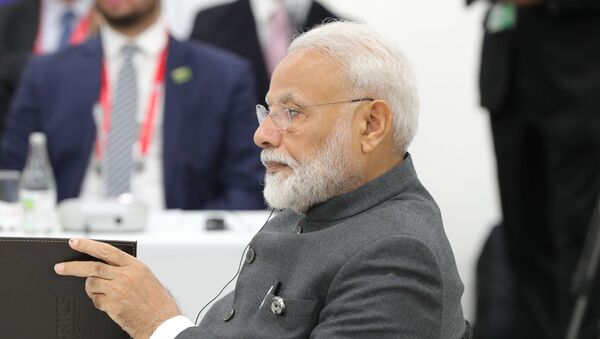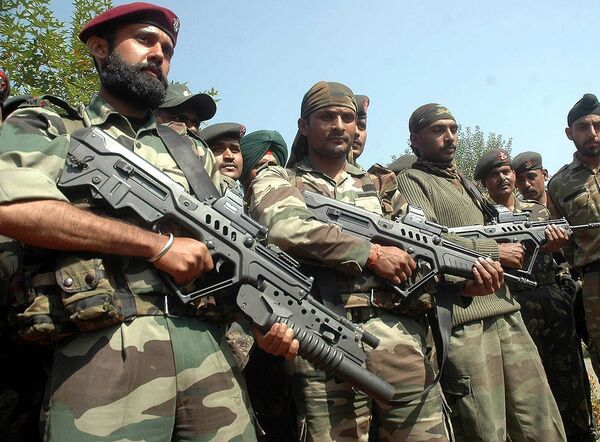Indian Prime Minister Narendra Modi faces a set of challenges on his upcoming visit to the US, including the diplomatically volatile Kashmir situation, following New Delhi's decision to strip the restive state of its special status and a difficult economic slowdown that is forcing his administration to reassess its policy framework.
Professor Harsh V. Pant, Director Studies and Head of Strategic Studies Programme at the Observer Research Foundation in New Delhi explained possible results of the negotiations.
Sputnik: Prime Minister Narendra Modi is in the United States for bilateral engagement with the Trump administration and engaging UN General Assembly. How do you see the visit vis-a-viz India's place on the world stage?
Harsh Pant: Mr. Narendra Modi, during the last five years – this is the sixth year of his government, has been trying to make India more visible around global conversations. The idea is basically to catapult India into a position which the government has defined very categorically, that it wants India to be in a position to be a rule shaper, not merely a rule taker.
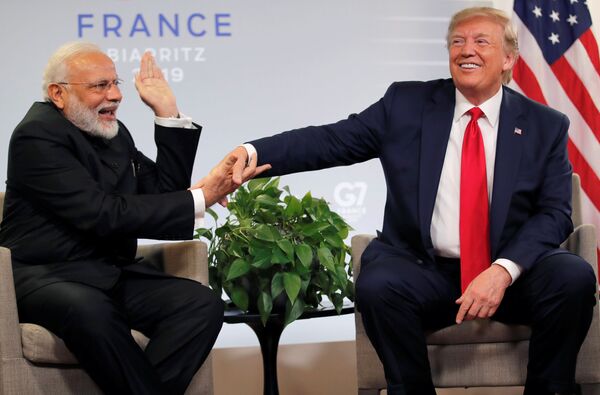
I think most of the conversations today on global governance issues involve India because India is such an important player. Modi has been pro-active on global stages; he wants to make a case where he wants India to be more engaged by showcasing his own personal outreach. That is perhaps the message he wants to make.
Sputnik: Modi's visit comes at a time when the Kashmir issue is a major diplomatic tug-of-war with Pakistan. But Modi appears happy to take the issue to the United Nations. Is it because India is confident of the support of the global community on its Kashmir decision?
Harsh Pant: There is a specific and sustained feature of Modi's outreach if you see his speeches even in the past. He has hardly mentioned Pakistan. He mentioned terrorism. Terrorism is a global problem, terrorism is a problem that has to be dealt with by all countries coming together. New Delhi has got, in the last few weeks and month, very strong support from the international community on Kashmir.
That gives Mr Modi perhaps a state of confidence going to the UN at a time when many in India are critical of his approach. As far as the world community is concerned, there is no doubt that Pakistan is finding it very difficult to get the traction and the fact that it continues to be hyperbolic in its response, often talking of nuclear escalation and a larger conflagration.
Sputnik: India's relation with the United States is that of sweet and sour – Prime Minister Modi's personal relations with President Trump is warm, but both the countries are engaged in trade-related conflicts. How do you reconcile to this situation?
Harsh Pant: If you look at how Trump has dealt with some of his closest allies –America's closest allies, you would have to acknowledge India has got a very good deal. On key issues of India's concern, he has been on the same page as India. Afghanistan is a very difficult issue to deal with.
It is all because of its inherent conflicts the talks were cancelled. Trump has reinvigorated the trade agenda. He knows trade is very close to his political agenda. He wants India and other countries to do more.
Even on trade, he has not been as disruptive vis a viz India as was the case with others. India would like to focus on the big picture, as while all these are irritants, trade is a problem, trade was even a problem during the time of Obama and we are trying to work it out. India also requires a long-term solution.
The focus on the big picture means that you converge between India and America today so that the two nations will have to walk together irrespective of these irritants.
And a Defence deal is another area where India is showcasing its ability to buy a lot of defence equipment from the US. As India resolves the larger issues of structural problems, I think some of those other issues can help propel the trade conversation forward. India is also very clear that the two sides are in constant negotiations on trade issues.
So perhaps we are looking forward to some sort of a trade engagement very soon – a sort of package deal. Perhaps some problematic elements would be taken care of by India.
Sputnik: Do you see a shifting of the stand of President Trump on Kashmir?
Harsh Pant: Trump's approach on Kashmir has been ad-hoc, like on all other issues. I don't think he understands the situation.
When he made the famous statement....he made it on the spur of a moment because Mr. Imran Khan was sitting with him, so why not, let’s give it a go...and the second day he changed it...."I want to mediate if Mr. Modi wants me to mediate." Then mediation was completely dispelled by the (State) Department itself.
It is futile to read too much into Trump's statement on Kashmir. Where India has been able to get the traction - the bureaucracy in the USA, State Department particularly and Defence Department also are quite aligned with Indian priorities. With Mr. Trump, India will have to be a bit cautious because he can go back and forth.
But the fact that he will be addressing the same rally with Mr. Modi indicates his priorities are completely different. Kashmir does not ring a bell for him, it does not matter. His priorities are basically first to get re-elected and therefore, to reinvigorate his space and his space has nothing to do with Kashmir.
Sputnik: On energy, India has been on different planes in so far as the US vis-a-viz Russia are concerned. Does it indicate a strategic shift back to New Delhi's old ally?
Harsh Pant: The two countries are different (Russia and the US)... their energy frameworks are different. In Russia, it is a state-led energy sector as in India by and large. In the US, the private sector dominates.
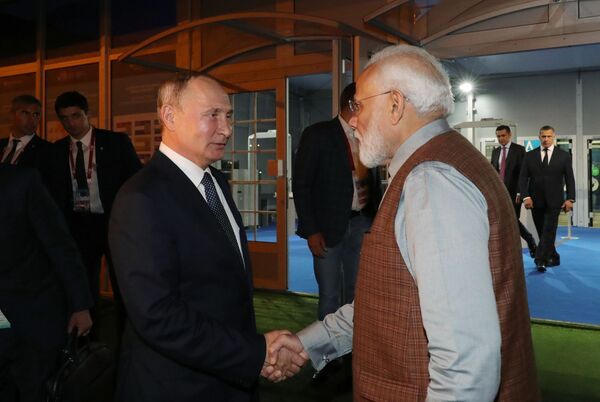
The more India is able to make a case, we are able to engage more with the private sector – we are able to engage with the energy sector in ways India has not before, it would be easier for American politicians to support India.
The way politics and economics are intertwined in Russia and in the US are two different entities and India is playing it to the strength of both the countries.
Sputnik: One of Mr. Modi's focus areas would be to seek investment from American businesses. Given the economic slowdown in India – in recent times there was a huge outflow of funds from India, do you expect he would be able to convince the business community there?
Harsh Pant: This is a challenge for Mr. Modi not to American investors alone, but for global investors.
Mr. Modi will have to make a strong case and that his government is on track with the economic reform agenda, his government is on track by creating a level-playing field for global investors that they feel welcome and some of the steps that have been announced in recent times by the finance minister are a step in that direction; some of the policy decisions announced in Parliament were taken back were primarily aimed at instilling confidence among the investing community.
I don't think this will be a one-shot approach; it would take time and we will have to see the numbers later, what would happen. A lot of these investors would like to hear from the man himself; what's his assessment of the economy and what he feels needs to be done; whether he is doing that.
If Mr. Modi is able to convey that, by way of some conviction, he would win half the battle. The remaining half will come when the investors actually come in. At the moment the American private sector is facing constraints because the Chinese market is closing up. So clearly they would be tempted to hear from the Indian Prime Minister what he has to say about the policy of India, what his roadmap is.
Sputnik: Today, as Mr. Modi addresses a huge Indian Diaspora in Houston, Texas Mr. Trump would also share the stage. What must have prompted the US President to join the rally?
Harsh Pant: It is a smart move by Modi. By galvanising the Indian Diaspora, Mr. Modi is making a number of points. One he is making a point directly to the American political establishment, India is not the hard power alone you see – the economic rise and military muscle.
India's soft power in its Diaspora is also important. Most of the cutting edge technological sector in America is dominated by Indians. They are the wealthiest, most educated Diaspora in the US.
So, for American political establishment, to understand that import, by doing these kinds of shows Modi is able to attract eyeballs in the US. The US is a very self-contained society, they are not very interested in what others are doing. The American political establishment is always dominated by what they are doing – domestic politics consumes them.
But when you do a show at their doorstep, when you demonstrate your power at their doorstep, you convey a very important message. Here is a Diaspora – my Diaspora that is a very important member of your community. So give India its due respect. I think that is an indirect way of playing on their emotion.
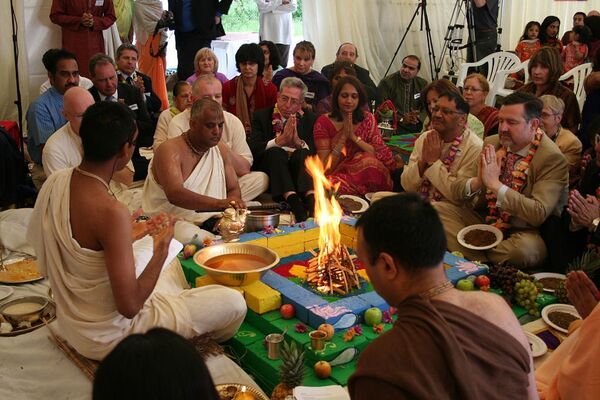
While he is connecting with the Diaspora, when you are telling the Diaspora to come and invest in India, do several things in India, you are very important for us, the message is equally connecting with Washington at the political establishment.
And therefore, it is not surprising Mr. Trump is going there. He has recognised that there is a Diaspora that has never voted for the Republicans if you can court that Diaspora even a fraction of that votes for Trump, that is a net gain for him. So Trump, being a shrewd politician understands that.
So he has his own agenda. Mr. Modi is playing his cards very well by showing off the power of Indian Diaspora that allows him to leverage some of its potential for India's advantage as well.
Sputnik: With this high-profiled visit what do you think are the takeaways for Mr Modi from his US visit?
Harsh Pant: There are two aspects – Indo-US engagement, which comes at a very critical time for India – Kashmir is an issue. There are/would be sections in the UN which would be very critical of India. Mr Modi himself taking that mantle, reaching out to the UN and taking his entire team there, they would be reaching out individually to various countries, the attempt would be to make India's narrative heard.
Somehow, western media do not take the Indian narrative, that's the perception in New Delhi. There is negativity about what's happening in Kashmir. The attempt would be to create a positive narrative to showcase India's view point.
The UN platform at this particular point in time – so many world leaders are there, is a very easy platform available to him and he wants to manage that. In that part of the engagement, Kashmir would be on the table, India's own leadership issue would be there.
The other issue is Indo-US engagement, where Mr. Trump is going to be the big issue, showcasing India's views, showcasing India's Diaspora, India's power that would be engaged.
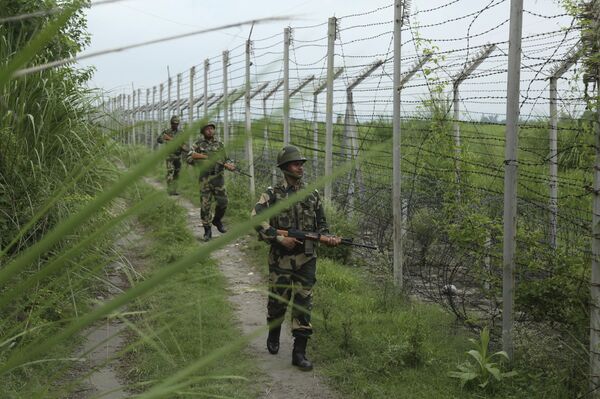
So you have two different agenda, which Mr. Modi would be hoping to fulfil, given these agendas are at some point of time converge with American politics. Mr. Modi is spending so many days in America that tells you, he takes this visit seriously and he wants something very productive to come out of it.
The views and opinions expressed in the article do not necessarily reflect those of Sputnik.
